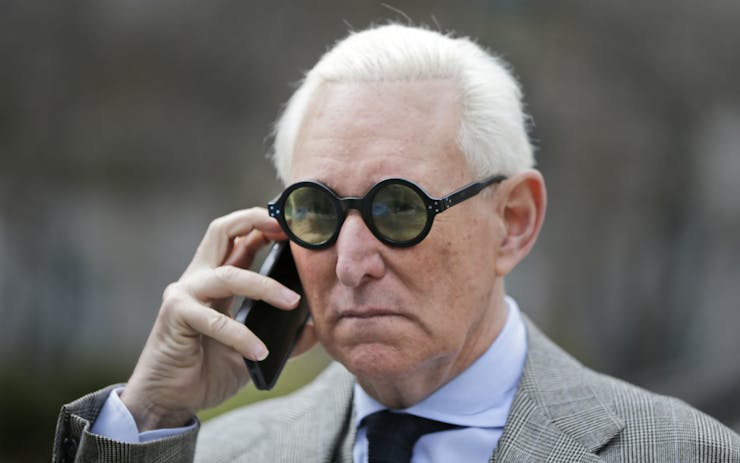Editor’s note: ‘The Haymaker’ is Leafly Deputy Editor Bruce Barcott’s weekly column on cannabis politics and culture.
What do you do when the devil adopts your cause?
Okay, Roger Stone is not literally Satan. But still...
That dilemma confronted me recently when Roger Stone, the notorious political trickster and longtime Trump advisor, formed a cannabis legalization advocacy group called the US Cannabis Coalition (USCC).
OK, Roger Stone is not literally Satan. He’s more like the Jason Sudeikis devil on “Weekend Update,” all red plastic horns and cape. He’ll smile and charm you and chuckle ruefully. Oh yeah! Good times. I’m a naughty stinker, I am.
Roger Stone carries out dirty political ops that sit two bus transfers away from the nearest ethical boundary. I’m not saying that. Roger Stone is saying that.
This is a man who boasts of turning his first political dirty trick in elementary school in 1960. An ardent John F. Kennedy supporter, he “remember[s] going through the cafeteria line and telling every kid that Nixon was in favor of school on Saturdays.” After converting to conservatism, he became Nixon’s go-to political ratfucker, sabotaging would-be rivals by, as he put it, “trafficking in the black arts.”
Nixon’s paranoid, score-settling style so entranced him that Stone had Nixon’s crooked visage inked on his back. You may think I’m speaking metaphorically. I am not.
Stone has been one of Donald Trump’s closest advisors since the late 1970s, when the two were brought together, fittingly, by the political fixer Roy Cohn. About whom, see under: Angels in America, McCarthyism, and Dark Arts (Past Practitioners Of). When WikiLeaks posted the hacked emails of Hillary Clinton’s campaign manager last year, Stone boast-tweeted his “backchannel” connections to Julian Assange. Wink, nudge.
In the recently released documentary Get Me Roger Stone, the eponymous subject embraces his villainy: “It’s better to be infamous,” he says, “than never to be famous at all.”
Legalization supporters hail from all points on the political spectrum. Two of the movement’s greatest champions are Rep. Dana Rohrabacher (hard-right Orange County conservative) and Rep. Earl Blumenauer (hard-left Portlandia character).
The problem with Roger Stone isn’t the team he plays for. It’s the dirty way he plays. So imagine my surprise when I found him cheering in the bleachers alongside me last week, wearing the jersey and cap of my beloved squad, all but high-fiving me after a home run.
“We have the ability legally to lobby, but [USCC is] really grassroots mobilization to remind the president to keep his pledge” to uphold states rights when it comes to cannabis, Stone told Leafly contributor Ed Muerrieta last week.
What to do? Reject his support, or embrace it?
I did some research and some thinking.
Let’s Make a Deal
Over the past 20 years American politics has seemingly turned into an all-or-nothing game. The point nowadays seems to be the complete and utter destruction of the opposition. No position is too extreme. Negotiation itself seems impossible in a time when compromise has become synonymous with betrayal—and electoral defeat.
One model: the conservative Koch brothers working with liberals on sentencing reform.
But there are moments when the old notion of politics as the art of the possible still holds. It most often happens at the local level but it also exists here and there in the national game too.
Case in point: The billionaire Koch brothers, widely loathed in liberal America, have made common cause in recent years with the sentencing reform movement. Most of those working to end America’s over-incarceration crisis come from the left side of the spectrum, but they’ve found a way to work with right-siders like David and Charles Koch (who describe themselves as libertarians), and other “smart on crime” conservatives in order to advance a common agenda. Likewise, the Kochs and other conservatives have averted their eyes to the many odious policies beloved by liberal reformers in order to get the job done.
Shop highly rated dispensaries near you
Showing you dispensaries nearCall it the Dirksen Rule
That “strange bedfellows” dynamic has a proud history in American politics. To pass the Civil Rights Act of 1964, Johnson had to overcome the opposition of Southern Democrats and conservative Republicans.
'You drink with Dirksen! You talk with Dirksen! You listen to Dirksen!'
The President instructed his chief Democratic ally, Sen. Hubert Humphrey, to pal up with Everett Dirksen, the Senate Republican Leader.
Dirksen, a rumpled and blustery conservative, may well have been the devil in the eyes of Humphrey, the very model of a reserved Minnesota liberal. As the legal historian Michael O’Donnell recounted in The Atlantic a few years ago, President Johnson gave Humphrey clear marching orders:
“You’ve got to spend time with Ev Dirksen. You’ve got to let him have a piece of the action. He’s got to look good all the time. Don’t let those [liberal] bomb throwers, now, talk you out of seeing Dirksen. You get in there to see Dirksen. You drink with Dirksen! You talk with Dirksen! You listen to Dirksen!”
Johnson cut deals to get votes from good ol’ boys in Texas. He strong-armed some senators and sweet-talked others. O’Donnell wrote that Johnson “engaged an army of lieutenants—businessmen, civil-rights leaders, labor officials, journalists, and allies on the Hill—to go out and find votes.” He told one labor leader to “talk to every human being you [can].”
That army of lieutenants wasn’t rostered with angels. A lot of them disagreed with Johnson’s positions. Many distrusted the man. Some of them probably hated his guts. But they agreed on one thing—passing the Civil Rights Act—and that’s all that mattered.
Stone is Human; Let’s Talk
I don’t know much about Roger Stone’s new group. It may be just an astroturf lobbying front. But I do know he’s signed up a group of advisors that includes Florida attorney and medical marijuana activist John Morgan (a potential Democratic candidate for governor), the conservative Fox News legal analyst Andrew Napolitano, former Minnesota Gov. Jesse Ventura, and Tyler Nixon, a Denver marijuana lawyer and great nephew of—yes, Richard Nixon.
Those are folks who, like Roger Stone, have some juice in national media and politics. I probably disagree with 90% of their political opinions. But I’m going to work together with them—and with Stone—on this issue. Because Lyndon Johnson was right. You talk to every human being you can.







